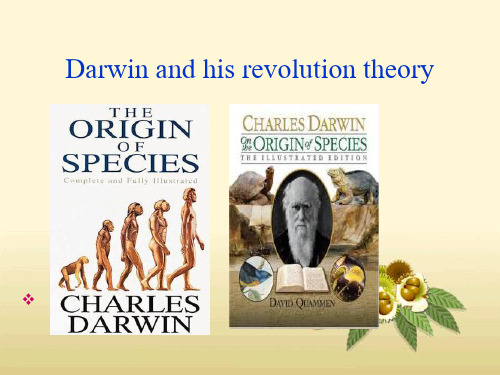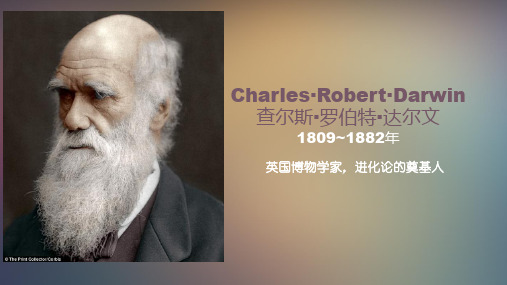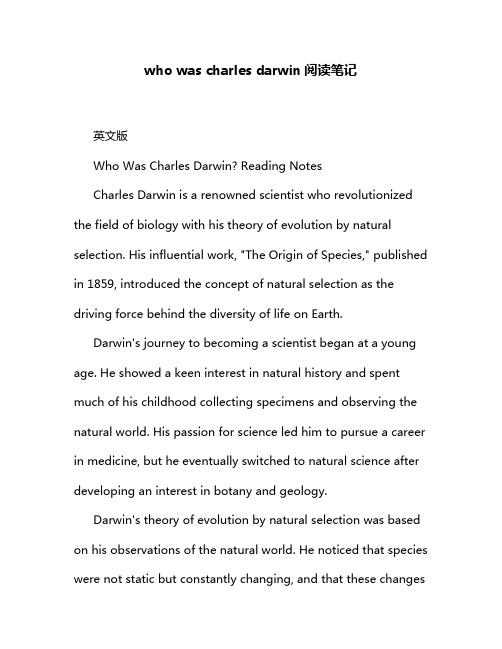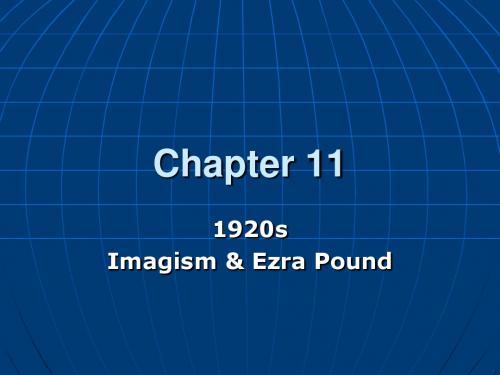Darwins Revolution
- 格式:pdf
- 大小:22.92 KB
- 文档页数:3





who was charles darwin阅读笔记英文版Who Was Charles Darwin? Reading NotesCharles Darwin is a renowned scientist who revolutionized the field of biology with his theory of evolution by natural selection. His influential work, "The Origin of Species," published in 1859, introduced the concept of natural selection as the driving force behind the diversity of life on Earth.Darwin's journey to becoming a scientist began at a young age. He showed a keen interest in natural history and spent much of his childhood collecting specimens and observing the natural world. His passion for science led him to pursue a career in medicine, but he eventually switched to natural science after developing an interest in botany and geology.Darwin's theory of evolution by natural selection was based on his observations of the natural world. He noticed that species were not static but constantly changing, and that these changeswere adaptive and resulted in better survival and reproduction. Darwin proposed that species evolved over time through the process of natural selection, whereby individuals with more favorable traits were more likely to survive and pass their genes to the next generation.Darwin's theory was groundbreaking at the time and faced significant opposition from religious and scientific communities. However, his ideas gradually gained acceptance and are now widely accepted as the foundation of modern evolutionary theory.Reading about Charles Darwin's life and work has been an eye-opening experience. His dedication to science and his courage to challenge conventional wisdom have left a lasting impact on the field of biology. His theory of evolution by natural selection has not only explained the diversity of life on Earth but has also provided a framework for understanding the origins and development of all species.中文版查尔斯·达尔文是谁?阅读笔记查尔斯·达尔文是一位杰出的科学家,他的自然选择进化论彻底改变了生物学领域。

达尔文的成功英文作文Title: The Success of Darwin: A Journey through Evolutionary Triumph。
Charles Darwin, a name synonymous with the theory of evolution, stands as one of the most influential figures in the history of science. His groundbreaking work laid the foundation for modern biology and revolutionized our understanding of the natural world. In this essay, we delve into the factors that contributed to Darwin's success and explore the lasting impact of his contributions.First and foremost, Darwin's insatiable curiosity and keen observation skills were instrumental in his success. As a young naturalist aboard the HMS Beagle, Darwin embarked on a five-year voyage around the world, during which he meticulously documented his observations of the diverse flora and fauna he encountered. His keen eye for detail and his ability to discern patterns in nature allowed him to gather a wealth of data that would laterform the basis of his theories.Furthermore, Darwin's willingness to challenge prevailing dogma and question established beliefs was crucial in shaping his revolutionary ideas. In an era dominated by religious orthodoxy and the concept of divine creation, Darwin dared to propose a theory that posited a natural explanation for the diversity of life on Earth. Despite facing fierce opposition from religious and scientific communities alike, Darwin remained steadfast in his commitment to the truth and continued to refine his ideas based on empirical evidence.Another key factor in Darwin's success was his ability to communicate his ideas effectively. In his seminal work, "On the Origin of Species," Darwin presented a compelling argument for the theory of evolution through natural selection, marshaling evidence from diverse fields such as paleontology, embryology, and biogeography. His clear and concise writing style, coupled with his logical reasoning and persuasive arguments, helped to win over many skeptics and cement his place in scientific history.Moreover, Darwin's success can also be attributed to the collaborative nature of scientific inquiry. Throughout his career, Darwin corresponded with a network of fellow scientists and scholars, exchanging ideas, sharing data, and engaging in spirited debates. This collaborative approach not only enriched Darwin's own thinking but also facilitated the dissemination of his ideas to a wider audience, ensuring their lasting impact on the scientific community.Finally, Darwin's success can be measured by the enduring legacy of his ideas. More than a century after the publication of "On the Origin of Species," the theory of evolution remains the cornerstone of modern biology, providing a unifying framework for understanding the diversity of life on Earth. Darwin's emphasis on the importance of variation, adaptation, and natural selection continues to shape our understanding of how species evolve and interact with their environments.In conclusion, the success of Charles Darwin can beattributed to a combination of factors, including his curiosity, his willingness to challenge conventional wisdom, his effective communication skills, his collaborativespirit, and the enduring legacy of his ideas. By daring to question the status quo and pursuing his scientificinquiries with rigor and determination, Darwin forever changed the way we view the natural world and our place within it.。
Deutsch lernen und unterrichten – ArbeitsmaterialienTop-Thema mit VokabelnDarwins RevolutionSein ganzes Leben lang befasste sich Charles Darwin mit der Natur. Seine Evoluti-onstheorie stellte schließlich die Wissenschaften auf den Kopf. Darwins Erkennt-nisse sind heute noch von großer Bedeutung.Charles Darwin wurde am 12. Februar 1809 in England geboren. Er studierte Medizin und Theologie, aber am meisten interessierte er sich für die Jagd und das Reiten. Er unter-suchte mit Begeisterung Tiere und war am liebsten in der Natur. 1831 bekam er die Chance, mit dem Forschungsschiff "HMS Beagle" zu reisen. Insgesamt fünf Jahre war Darwin unterwegs und besuchte verschiedene Kontinente.Auf seiner Reise sammelte Darwin getrocknete Pflanzen, Fossilien, Insekten und Vögel. Zurück in London untersuchte er vor allem die Finken, die er auf den Galapagos-Inseln gefunden hatte. Viele von ihnen hatten einen kurzen dicken Schnabel. Damit knackten sie Nüsse und Samen. Andere hatten einen langen dünnen Schnabel, mit dem sie in Blü-ten und schmale Ritzen hineinkamen. Darwin erkannte, dass diese Finken gemeinsame Vorfahren haben mussten, aus denen sich mit der Zeit unterschiedliche Arten entwickelt hatten. Die Evolutionstheorie war geboren. Es folgten viele Jahre, in denen Darwin weiter-forschte.Als er sein Buch "Die Entstehung der Arten durch natürliche Auslese" 1859 veröffentlich-te, waren die Reaktionen sehr unterschiedlich: Lob und Begeisterung, aber auch Kritik und Empörung, vor allem bei der Kirche. Denn die biblische Schöpfungslehre besagt: Gott hat sämtliche Lebewesen – Mensch, Tiere und Pflanzen – innerhalb von sechs Tagen so erschaffen, wie sie heute aussehen. Darwin wurde als Atheist beschimpft, weil er sagte, dass alle Lebewesen sich stetig verändern und dass sie miteinander verwandt sind. Heute sind Darwins Erkenntnisse über die Entstehung der Tiere und der Menschen weit-gehend bestätigt, zum Beispiel auch seine Vermutung, dass der erste Mensch aus Afrika stammt. Er selbst verteidigte seine Thesen nie öffentlich, schrieb aber bis zu seinem Tod noch viele Bücher. Der Wissenschaftler starb am 19. April 1882 im Alter von 73 Jahren. Ihr Deutsch ist unser Auftrag!Deutsch lernen und unterrichten – ArbeitsmaterialienTop-Thema mit VokabelnGlossarEvolutionstheorie, die – die Idee von der Entwicklung der Lebewesenetwas auf den Kopf stellen – etwas stark verändernTheologie, die – die Lehre einer ReligionBegeisterung, die – die Freude; der SpaßFossil, das – sehr alte zu Stein gewordene TierskeletteFink, der – ein kleiner bunter VogelSchnabel, der – der Mund der Vögeletwas knacken – hier: öffnenSamen, der – das Korn einer Pflanze, aus dem eine neue Pflanze wachsen kann Ritze, die – ein längliches LochVorfahre, der – die Großeltern, deren Eltern und so weiternatürliche Auslese, die – die Tatsache, dass in der Natur die Lebewesen sterben, die nicht gut an ihre Umwelt angepasst sindEmpörung, die – die starke Wut; das Beleidigtseinbiblisch – bezogen auf die BibelSchöpfungslehre, die – die Lehre, wie das Leben durch einen Gott entstanden ist Atheist, der – jemand, der nicht an einen oder mehrere Götter glaubtstetig – immer, andauerndThese, die – die Idee; die VermutungIhr Deutsch ist unser Auftrag!Deutsch lernen und unterrichten – ArbeitsmaterialienTop-Thema mit VokabelnFragen zum Text1. Charles Darwin schrieb ein Buch über die Evolution, weil er …a) nicht an Gott glaubte.b) durch seine Forschung Beweise für sie gefunden hatte.c) er nicht an Finken interessiert war.2. Eine der Behauptungen der biblischen Schöpfungslehre ist, dass …a) der erste Mensch aus Afrika kamb) alle Lebewesen sich weiterentwickelnc) alle Lebewesen schon immer so waren, wie sie jetzt sind3. Das Buch, … Darwin seine Theorie erklärte, erschien 1859.a) wob) darinc) in dem4. Die Finken, … Schnäbel kurz und dick sind, können gut Nüsse knacken.a) derenb) dessenc) diese5. Das Schiff, … Darwin seine Forschungsreise unternahm, hieß "HMS Beagle".a) auf demb) wohinc) in dasArbeitsauftragJede Kultur hat ihre eigenen Geschichten über die Entstehung des Lebens und der Men-schen. Welche kennen Sie? Erzählen Sie im Kurs, welche Schöpfungsmythen es in Ihrem Heimatland gibt.Ihr Deutsch ist unser Auftrag!。